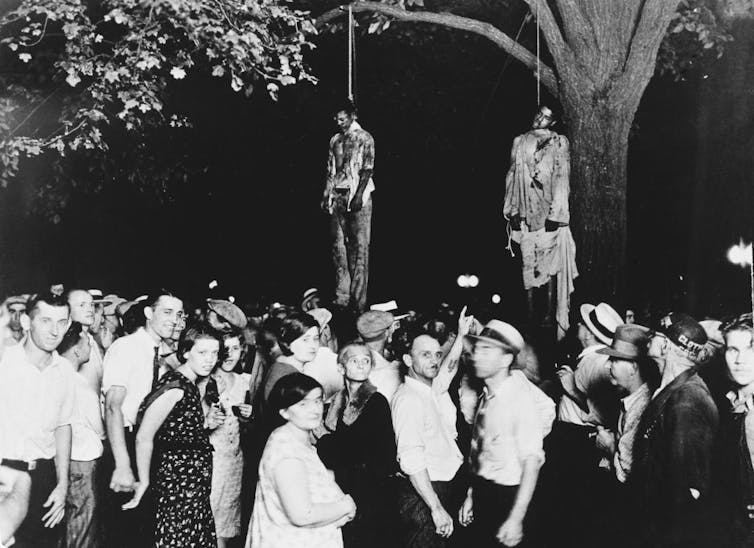Sixty-five years up to now, on July 17, 1959, Billie Trip died at Metropolitan Hospital in New York. The 44-year-old singer arrived after being turned away from a close-by charity hospital on proof of drug use, then lay for hours on a stretcher throughout the hallway, unrecognized and unattended. Her property amounted to 70 cents throughout the monetary establishment and a roll of funds hid on her particular person, her share of the price for a tabloid interview she gave on her deathbed.
Presently, Trip is revered as one of many influential musical artists of all time. Time journal named her 1939 recording of “Uncommon Fruit” the tune of the 20 th century. “On this sad, shadowy tune about lynching throughout the South,” Time wrote in 1999, “historic previous’s greatest jazz singer entails phrases with historic previous itself.”
Abel Meeropola New York Metropolis teacher and songwriter who used the pen title Lewis Allan, wrote “Uncommon Fruit” after seeing {{a photograph}} of a lynching that shocked and haunted him: “Black physique swinging throughout the Southern breeze / Uncommon fruit hanging from the poplar timber.”
Trip’s rendition of Meeropol’s tune stays as attractive – and searing – at current as when it was first recorded. “It hits, laborious,” syndicated columnist Samuel Grafton wrote shortly after the file’s launch in 1939. “It is as if a sport of let’s fake had ended.”
I’m a scholar of American religion, literatureand the humanitiesand I’m throughout the methods during which even powerfully secular works draw energy from spiritual narratives of justice, injustice, truth-telling and redemption. I uncover “Uncommon Fruit” a resonant occasion.
Unflinching lyrics
Like so many composers whose songs Trip recorded – George and Ira Gershwin, Irving Berlin, Jerome Kern – Meeropol bought right here from a family of Jewish immigrants to America who fled antisemitic violence in Europe.
Two Good Migrations outlined America throughout the early 1900s: rural South to industrial Northand Outdated World to New. Every have been pushedpartly, by the necessity to go away racial terror behind.
Collectively, these migrations enabled quite a lot of probably the most enduring musical collaborations of the 20 th century. Thematically, the joint productions of Black and Jewish musical artists – Broadway productions of “Current Boat” and “Porgy and Bess,” Trip’s performances with Benny Goodman and Artie Shaw – tended to sidestep the brute realities of prejudice, focusing instead on the luxurious of irregular happiness and unhappiness.
“Uncommon Fruit” was completely completely different. The tune gazes unflinchingly on the “uncommon fruit” of the title: hanged, burned and mangled flesh left to rot on a tree.
Successfully into the 20 th century, white vigilante mobs murdered a whole lot of Black People with impunity: lynching then leaving their our our bodies on present as a terrorist spectacle.

Lawrence Beitler/by Hulton Archive/Getty Footage
Meeropol first jotted the tune’s phrases and music on the once more of a cabaret program dated Nov. 13, 1938 – 4 days after Kristallnacht, the night of murderous anti-Jewish rampages all by means of Nazi Germany that grew to develop into a tipping stage for the Holocaust.
For Meeropol, a labor activist and a secular Jew, Black and Jewish People marched shoulder to shoulder within the purpose for freedom from injustice. In a single different poem, he associated anti-Black violence with the persecutions of Jews:
I am a Jew.
How may I inform?
The Negro lynched
Strikes a chord in my memory properly
I am a Jew.
Black Christ
As Meeropol linked anti-Black and anti-Jewish prejudice, many Black Christians moreover associated their fighting that of the Hebrew slaves throughout the Bible – and with Jesus’ private.
In response to theologian James Cone“Black ministers preached about Jesus’ lack of life better than another theme because of they seen in Jesus’ struggling and persecution a parallel to their very personal encounter with slavery, segregation, and the lynching tree.”
Inside the decade Trip recorded “Uncommon Fruit,” Harlem Renaissance writers WEB Du Bois, Countee Cullen and Langston Hughes all centered works throughout the decide of the crucified Black Christ.
Most African American Christians belong to Protestant church buildingsnevertheless Trip did not. As a child she was baptized Catholic at a convent reform school, Baltimore’s House of the Good Shepherd for Colored Girlsthe place she was twice despatched by the courts. She remained ambivalently Catholic for the complete of her life.
The stuffed cross
Protestant church buildings typically present the “empty” cross, displaying the instrument of Jesus’ execution, nevertheless not his physique. The message of the empty cross is resurrection and new life. In response to the Christian story, Jesus was crucified, buried and rose from the ineffective to redeem humankind from sin.
In Catholic settings, one is further extra prone to uncover the “stuffed” cross: the physique of Jesus with arms outstretched, fingers and toes nailed to the picket. The crucifix emphasizes the agony of Jesus’ lack of life and his solidarity with all that undergo.

Library of Congress by means of Wikimedia Commons
The stuffed cross moreover communicates the message that the crucifixion of Christ – God in human sort – simply is not a once-and-for-all event.
“When [Meeropol] confirmed me that poem,” Trip acknowledged of “Uncommon Fruit,” “I dug it correct off” because of it “appeared to spell out the entire points that had killed Pop.” Her father, jazz guitarist Clarence Trip, died at 39 whereas touring in Texas. She believed he’d been refused lifesaving care attributable to his race.
Trip’s “Uncommon Fruit” evokes the stuffed cross in its testament to lynching as ongoing actuality. “It nonetheless depresses me every time I sing it,” Trip acknowledged in her autobiography. “Nevertheless I’ve to take care of singing it … the problems that killed him are nonetheless occurring throughout the South.”
Journalist Vernon Jarrett recalled seeing Trip perform in 1947. She was “singing this tune as if this was for preciseas if she had merely witnessed a lynching,” Jarrett acknowledged of “Uncommon Fruit.” “There was a method of resignation, as if ‘these people are going to have power for a really very long time and I can’t do a rattling issue about it in addition to put it in a tune.‘”
Ongoing testament
Retaining agency with brokenness, fairly than transcending or overcoming it, moreover describes Trip’s method of relating to others in precarious circumstances. Her Harlem home, she acknowledgedwas a “combination YMCA, boardinghouse for broke musicians, soup kitchen for anyone with a hard-luck story, neighborhood coronary heart, and after-hours joint.”
A 1943 papal encyclical described the church itself equally, as a spot of shared ache, solace and sustenance. Anyone with out money “may go there and eat,” poet and jazz vocalist Babs Gonzales recalled of Trip’s place. “She fed everybody in New York for 4 years.”
Trip closed items with “Uncommon Fruit” from 1939 until the final word months of her life. In making it her trademark tune, she provided solidarity and reliable witness to racial violence and injustice, not the therapy for these. Nevertheless her testament carried extraordinary power.
Shortly after the 2020 murder of George Floyd, Bruce Springsteen, a fellow Catholic with “misgivings,” made a playlist for America. First on his itemizing was “Uncommon Fruit.”
Requested whether or not or not he was optimistic regarding the future, Springsteen answered throughout the spirit of Trip: witness, not triumph. “I don’t suppose anybody really is conscious of the place we’re going from proper right here,” he knowledgeable writer David Brooks. Nevertheless all people “can see correct now that the established order simply is not okay. And that’s progress.”
